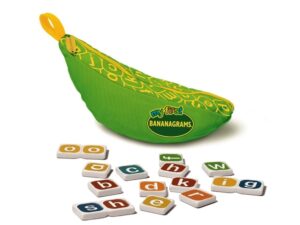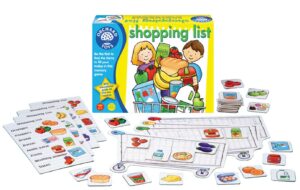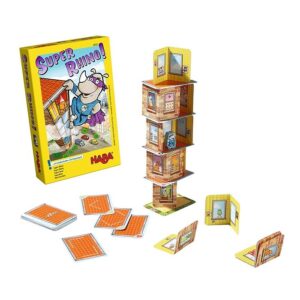Education through play is a huge part of primary school curriculum, and as such, kids games, particularly those for preschool and prep, teach and reinforce some fundamental skills that we often forget as adults. Learning how to take turns, how to plan ahead, following a sequence, when to share information, and of course, how to win and lose gracefully.
This is all wonderful… but you’ve got to get the kid to the table to play before any of these things can even make an impression. So what do I do to get my daughter (5 going on 30) to play a game?
• I play when she wants to play. Grab that moment when all the subliminal suggestions I’ve been laying suddenly coalesce into “Daddy, can we play a game?”
• I play what she wants to play. Currently it is Frozen Labyrinth Junior, but Ticket to Ride: First Journey, My First Bananagrams, and Spot It have been popular. 
• I model how to win and lose. When I lose, I do so with a laugh and celebrate how she did well and perhaps what I could have done better. When I win I don't gloat but I’ll celebrate the things that worked and avoid pointing out her errors.
• I enable her to succeed. Not straight out win, but I suggest, or hint at, smart play. “If you move here, you might slow me down!”, or “Can you remember a way to get more of that item?”.
• Get everyone involved. If Mum and Dad are getting crushed then she loves it. Or she is ganging up on Dad with Mum.
• Don’t sweat the rules… kinda. Board games are all about structure and sequence, and as a life skill this is important to learn. However, at a young age it’s all about play first, then rules. If things go off the rails, make it clear this isn’t the game any more, but play along. Perhaps you can steer it back (“Didn’t you have 2 gems and 1 apple before? Do you want to keep playing?”) but if it ends before there is a winner, then so be it. They’re playing and having fun.
• Get them to help set up and pack up the game.
• Make playing games normal. Have a regular game night, or make playing a ‘quick game before lunch’ a normal occurrence.
• Play games you know how to play. When guiding anyone through game rules, you need to be confident. If you’re unsure, watch a ‘how to play’ video and learn together. I’ll bet their memory is pretty sharp…
Games for young children enable all of the above. The games have simple rules, largely keep it focused on one skill (counting, letters, colours, etc), have robust components, can set up and play in a short time, and have a narrative to hang all of these structures off. As we get older we can make logical decisions, have longer(?) attention spans, can handle more complex rules interactions, abstract concepts, to the point the ‘heaviest’ board games have many rules systems weaving a fine netw… Oh… she’s run off.
But I will play on, because in a few years this little girl will be making decisions that DESTROY my crops/armies/reputation/zombies/finances.
What have you found works in your family?
Some suggestions for kids games between 2 and 6:
• Card games with simple rules, like Uno, Happy Families, Go Fish (and you can buy ‘card holders’ so their little hands can hold all these cards!)
• Any of the Orchard range. English company, super sturdy cardboard, excellent reputation for fun educational games. Shopping List is a particular favourite. 
• Any of the Haba range. A German company that has won many awards for their imaginative themes and beautiful wooden pieces. Orchard and Rhino Hero are great. 
• Memory based games (classic ‘match 2’ and variants)
• Snap, Spot it, Ghost Blitz (just watch the reflexes!)
• My First Bananagrams for when words start happening. Playing with the tiles, then playing the game…




